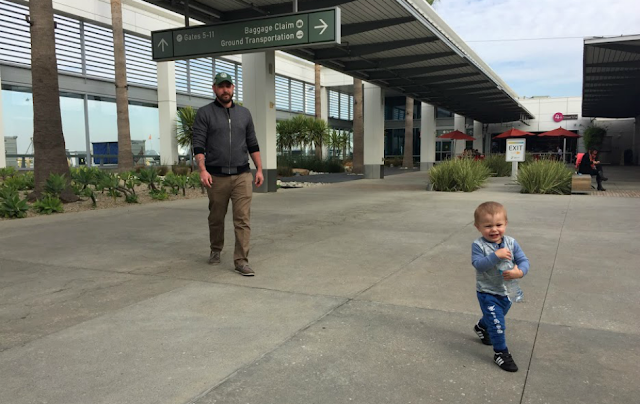
I’m officially part of the club. What club you ask? — The one for mothers who have experienced their toddler melting down in an extremely public setting. The kind of meltdown that included crying, screaming, shouting, kicking, throwing objects, flailing, etc., etc., etc. I was just so certain the first time this was to happen it would be at home, in a controlled setting where I would have time to trial and error, and troubleshoot to see what worked for an eventual public meltdown.
But instead, it happened for the first time in line while boarding an American Airlines 5-hour flight from Phoenix to Boston. And it wasn’t just any ol’ line. It was the longest line that never seemed to move forward. But then once we started to move forward — we passed through a gate (from hell) into a metal cylinder (other wise known as an airplane) that just intensified his scream, forced us into even closer quarters with our line mates and caused first class passengers who were chatting on their cellphones to look at me, above their reading glasses, move their phone away from their mouth but not their ears and “shh” me. Not him. Me. As if I was able to make an instant change in something I was doing to make the meltdown stop in its tracks and create peace and quiet for our flight companions.
The thing is… I’m with children who melt down for various reasons all the time — in my classroom. Sure, they’re older… they can be reasoned with a bit more, they have language skills on their side so we can verbally work out their problem more quickly — but a meltdown is a meltdown. It doesn’t matter how old you are. As I was thinking about what I should have done (don’t you just love hindsight?) here’s what I’ve come up with:
1. Pick my battles: The whole thing started because he put an animal cracker on the floor (to make the giraffe walk — duh!) and I grabbed it from his hand and told him not to eat it. Enter: the tears. Now, it was disgusting. In my germs-are-the-enemy mind, I couldn’t sit there and allow him to eat food off the airport floor. BUT… and this is a huge BUT — it was one animal cracker. I’m no scientist but I’m pretty sure the same amount of germs were probably on his hands (as he was touching the ground that we were sitting on) as on the giraffe. And I didn’t stop him from putting his hands in his mouth. I should have said something to him like “remember don’t touch the ground!” or I could have offered a trade (the germ-filled giraffe for a clean one that I was holding).
2. Stay calm: The minute the crying started, I panicked! My immediate response was to isolate the situation and to not allow it to escalate. So what did I do? I picked him up for a hug, obviously. Enter: the screaming/shouting and the throwing objects. He didn’t want to be picked up or touched and I did it anyway. I could have opened my arms for a hug and had he denied it I could have redirected or distracted — offered another snack, water, a toy, etc.
3. When giving choices, agree with either choice: See, rather than offer a quick and easy distraction available to us in my overly-packed diaper bag I thought it would be a good idea to offer a walk. A walk… in a crowded airport terminal, with thousands of people and golf carts and coffee lines and K9 dogs, etc., etc., etc. Truth be told, I thought he would deny my offer and I was unprepared to ACTUALLY allow him to walk around in the commotion. Plus we were in line to board. So had we walked around… we would have lost our spot! So when he accepted my offer and then I didn’t ACTUALLY allow him to walk around wherever he wanted…. enter: the flailing. I shouldn’t have offered him something that I wasn’t okay with.
4. Work with, not against, your people: Anyone you’re with. For this event, Sean and I were together but we’re still learning to communicate when it comes to Javi in stressful situations. But here’s the thing — as soon as there was friction between us (the silence, the stares, etc.) — Javi’s emotions escalated. Enter: the kicking! I should have worked with Sean to de-escalate the situation. I know children feel the energy of the adults around them. I should have accepted help from him, been more open about what we should do and been more receptive to his ideas, too. It takes a village, right?
5. Timing is everything: I literally mean… every minute that passes is one less minute you will have to endure this event. Very much like labor! What are your tips to work through a toddler meltdown? 🙂
Discover more from Jasmine H. Duffy
Subscribe to get the latest posts sent to your email.
